
Karl Hartl was an Austrian film director.

Old Heidelberg is a 1959 West German drama film directed by Ernst Marischka and starring Christian Wolff, Gert Fröbe and Sabine Sinjen. It is an adaptation of the 1901 play Old Heidelberg by Wilhelm Meyer-Förster.
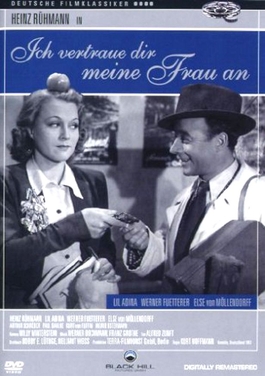
I Entrust My Wife to You is a 1943 German comedy film directed by Kurt Hoffmann and starring Heinz Rühmann, Adina Mandlová, and Werner Fuetterer. It was shot at the Babelsberg Studios in Berlin. The film's sets were designed by the art director Willi Herrmann.

A Tango for You is a 1930 German musical film directed by Géza von Bolváry and starring Willi Forst, Fee Malten, and Paul Otto.
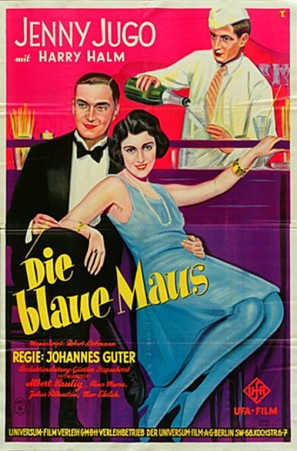
The Blue Mouse is a 1928 German silent comedy film directed by Johannes Guter and starring Jenny Jugo, Harry Halm, and Brita Appelgren. The film was distributed in England by Gaumont in a sound version. While the sound version had no audible dialog, it was released with a synchronized musical score with sound effects using both the sound-on-disc and sound-on-film process.
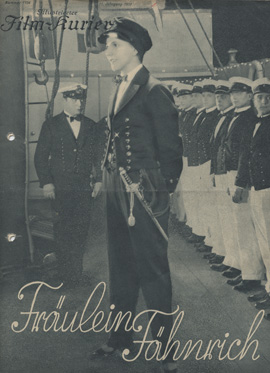
Miss Midshipman is a 1929 German silent comedy film directed by Fred Sauer and starring Mary Parker, Willi Forst and Fritz Schulz. The film's sets were designed by the art director August Rinaldi.

Princess Turandot is a 1934 German comedy film directed by Gerhard Lamprecht and starring Käthe von Nagy and Willy Fritsch. A separate French-language version, Turandot, Princess of China, was also released.
The Runaway Girl is a 1928 German silent comedy film directed by Hanns Schwarz and starring Käthe von Nagy, Vivian Gibson and Jean Dax. The film's sets were designed by the art director Erich Zander.

Debit and Credit is a 1924 German silent drama film directed by Carl Wilhelm and starring Hans Brausewetter, Mady Christians, and Theodor Loos. It is based on the 1855 novel Debit and Credit.

Gypsies of the Night is a 1932 German film directed by Hanns Schwarz and starring Jenny Jugo, Hans Brausewetter, and Paul Kemp. A separate French-language version Happy Hearts was also released.

So Ended a Great Love is a 1934 German historical romance film directed by Karl Hartl and starring Paula Wessely, Willi Forst and Gustaf Gründgens.

The Spanish Fly is a 1931 German comedy film directed by Georg Jacoby and starring Betty Bird, Lizzi Waldmüller and Fritz Schulz. It was shot at the Halensee Studios in Berlin. It was based on the 1913 play The Spanish Fly by Franz Arnold and Ernst Bach. The film was remade in 1955.

Miracles Still Happen is a 1951 West German romantic comedy film directed by Willi Forst and starring Forst, Hildegard Knef and Marianne Wischmann. It was intended by Forst as a less risqué follow-up to his controversial The Sinner which had also starred Knef. It was shot at the Bendestorf Studios and on location in Hamburg, Bavaria and Austria. The film's sets were designed by the art director Franz Schroedter and Karl Weber.

The Road to Paradise is a 1956 French-German romantic comedy film directed by Willi Forst and Hans Wolff and starring Georges Guétary, Christine Carère and Claude Farell. The film is the French version of the 1955 German film The Three from the Filling Station, which was itself a remake of a 1930 film.
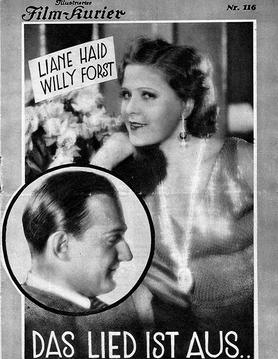
The Song Is Ended is a 1930 German romantic musical film directed by Géza von Bolváry, and starring Liane Haid, Willi Forst, and Margarete Schlegel. A separate French-language version Petit officier... Adieu! was also produced. It was shot at the Tempelhof Studios in Berlin. The film's sets were designed by the art directors Robert Neppach and Erwin Scharf.

My Son the Minister is a 1937 German comedy drama film directed by Veit Harlan and starring Hans Brausewetter, Heli Finkenzeller and Françoise Rosay.

You Must Be Blonde on Capri is a 1961 West German comedy film directed by Wolfgang Schleif and starring Karin Baal, Helmuth Lohner and Maurizio Arena.

Cabaret is a 1954 West German drama film directed by Willi Forst and starring Paul Henreid, Eva Kerbler and Fritz Schulz. It was shot at the Bavaria Studios in Munich. The film's sets were designed by the art director Willy Schatz and Werner Schlichting.
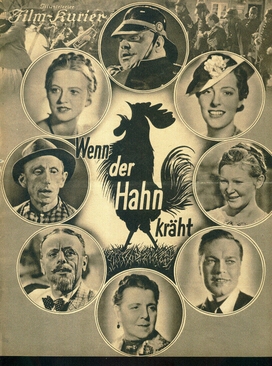
When the Cock Crows is a 1936 German comedy film directed by Carl Froelich and starring Heinrich George, Hans Brausewetter and Marianne Hoppe. It was shot at the National Studios in Berlin. The film's sets were designed by the art directors Walter Haag and Franz Schroedter. It is based on a folk play of the same title by August Hinrichs.

Her Highness the Saleswoman is a 1933 German comedy film directed by Karl Hartl and starring Liane Haid, Willi Forst and Paul Kemp. The film is based on the play My Sister and I by Georges Berr and Louis Verneuil. It was shot at the Babelsberg Studios in Potsdam. Location shooting took place around Lake Constance and Lindau in Bavaria. The film's sets were designed by the art director Werner Schlichting. It premiered in Hamburg and first appeared in Berlin at the city's Gloria-Palast. A separate French-language version The Princess's Whim was also produced.



















